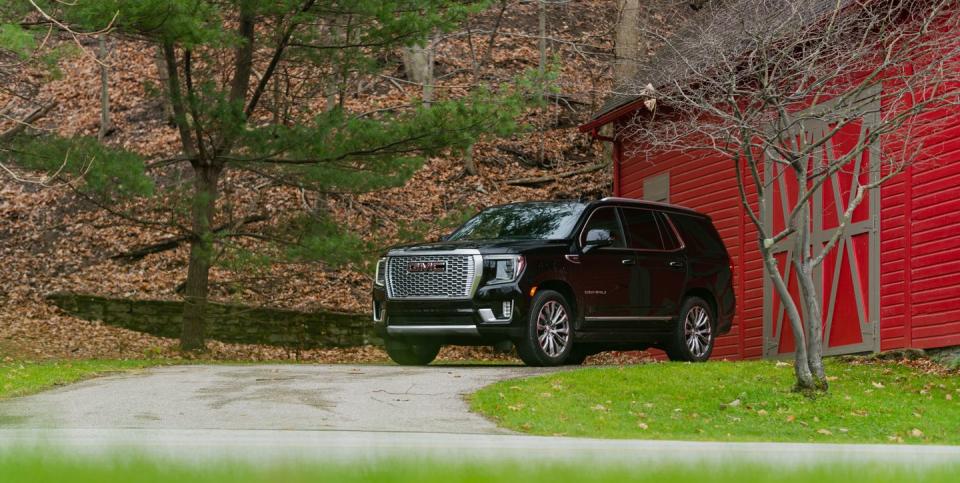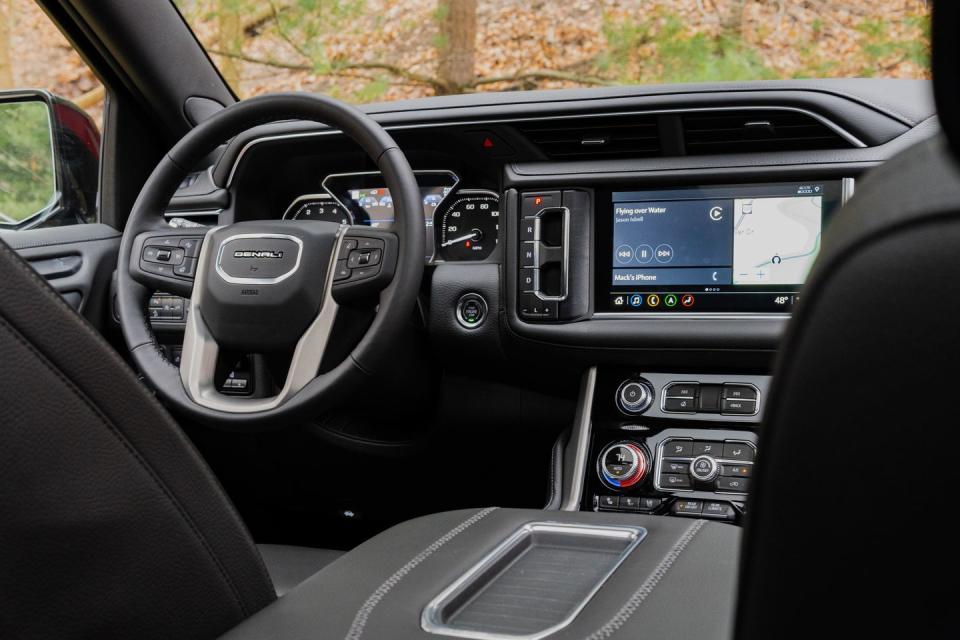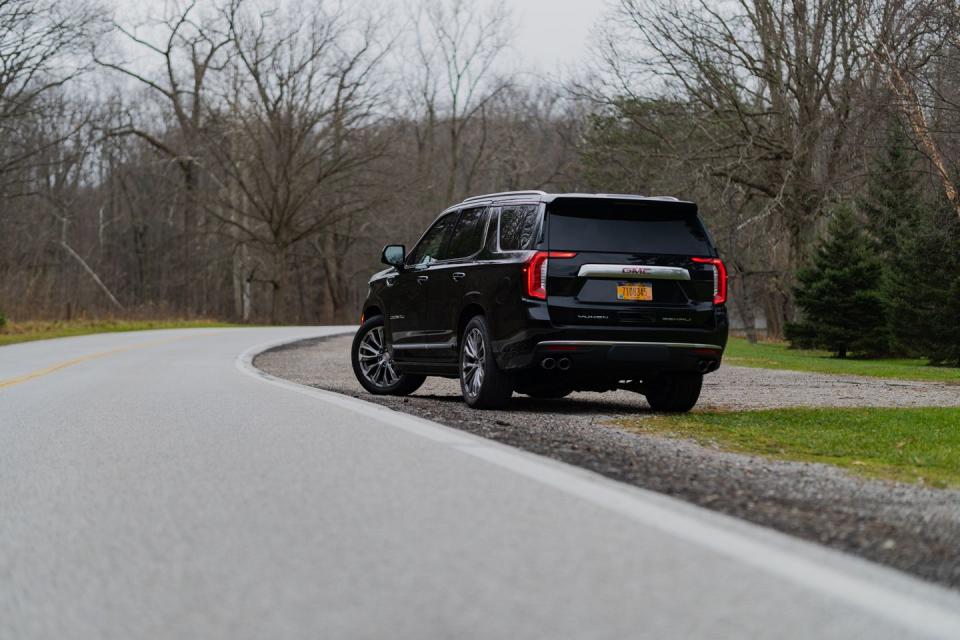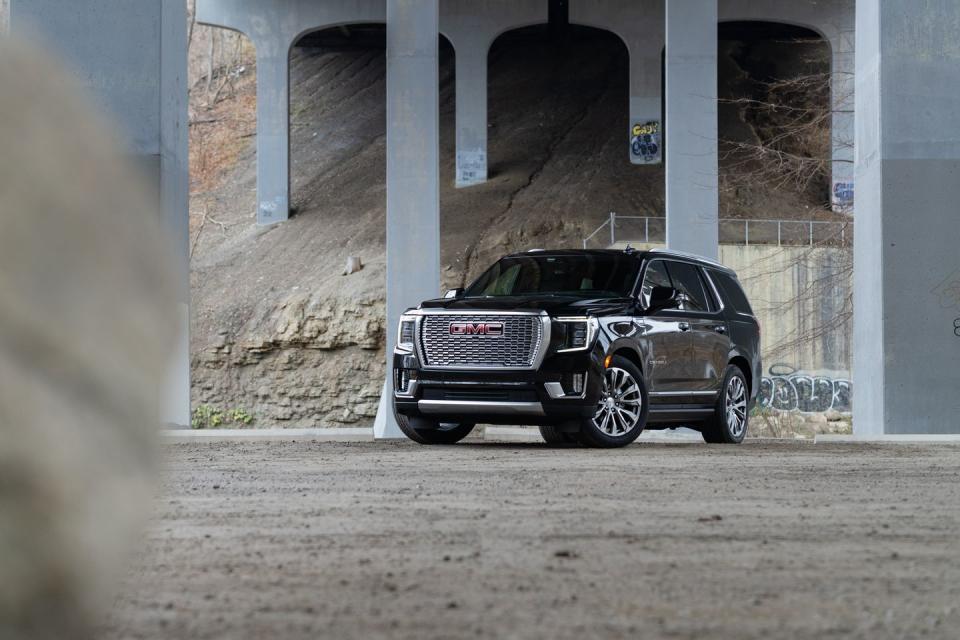The 2021 GMC Yukon Denali Is the Ultimate Road Trip Machine

If you need to cover massive stretches of this country’s unending freeways, your two best options come from opposite ends of the automotive spectrum. Some are partial to the long-legged, subdued prowess of a tightly-wound German super sedan, like the Mercedes-AMG S63 or the Audi S8. They’re powerful and planted, able to tackle long distances at obnoxious speeds while remaining completely at ease. You can relax, secure in the knowledge that a suite of hyperactive technology and unflappable dynamics will keep you on the straight and narrow.
But there are those who flip to the opposite pole, preferring a calm, capacious body-on-frame truck to eat up the interstate. If that’s your school of thought, few vehicles better fit this brief than the 2021 GMC Yukon.
It’s no coincidence that America's highways are full of big-bodied SUVs and full-size trucks. They lack the no-nonsense unflappability of the Germans, flying instead on relaxed suspension setups that soften big bumps, whisked along by understressed engines, with massive cabins and light steering that makes them easy to pilot for hours on end.
Ten years ago the gap was wide, with the Germans’ suspension advantage far ahead of anything the trucks of the time could offer. But the 2021 GMC Yukon Denali is working with four-wheel independent suspension, coil springs, optional magnetorheological shocks, and available air springs. It’s effectively solved the sloppy ride issue, with our magneride-equipped Denali tester exhibiting some of the best ride quality of any body-on-frame truck. It also managed body vibrations far better than its platform mate, the Chevy Tahoe, offering a ride experience closer to an Escalade’s without the glitzy interior or stratospheric price point.
That’s not to say it’s cheap. The Yukon Denali starts just shy of $70,000 whether you opt for the 3.0-liter diesel straight-six or the gas-chugging 6.2-liter V-8. The 5.3-liter V-8 isn’t available on the Denali, a decision that preserves this trim's position at the top of the Yukon line but deprives buyers of an engine that’s plenty potent for 90 percent of applications. Most will end up with the 420-hp 6.2, with 450 lb-ft of torque routed through a 10-speed automatic. You might expect the top-dog engine to out-pull the base model, but the Yukon with the most trailer-towing capacity is actually a lower-spec SLE or SLT with the 5.3 and rear-wheel drive. That’ll tow 8500 lbs, but even a four-wheel-drive Denali can pull 8200 lbs, plenty for anyone not in the market for a heavy-duty truck.

Towing a trailer, though, would require you to find an object that doesn’t fit in the Yukon’s cabin. After ten days with the truck, it’s hard to imagine such an item exists. Passenger room is great in the first, second, and third rows, with the independent suspension paying special dividends in the cheap seats. It’s not minivan-good, but the third-row bench is entirely usable for adults. Unlike the previous generation, the new Yukon offers a sizable amount of space behind the back seats even in short-wheelbase guise. All of this is aided by a battery of cubbies, compartments, and cupholders to swallow every road snack, spare bottle, and extra bit of clothing you’ll have floating around. Part of what makes these trucks so great for long hauls is how you never feel confined. Leave the cramming of wallets and phones and toll receipts in a single cupholder to the Germans. You’re in the Land of the Large. Spread out and stay awhile.
That’s the true benefit of all of this excess: It erases stress. You don’t have to worry about passing power; you have it. You don’t have to worry about space for that extra suitcase; you have it. And you don’t have to worry about the endurance to press on for another couple of hours; you have it. Because the Yukon is fundamentally low-stress, undisturbed by the endless chirps and clever gimmicks of the luxury-car elite. There were times when I missed a proper lane-keeping system to handle some of the steering load, but there was never a moment when I wanted another computer to tell me “Place Hands On Wheel” when they’d been parked there for hours. I wouldn’t mind massage seats and a digital dash, but I would in fact mind the menus and mental effort it would take to get them all set, always a frustrating task in modern cars.

The Yukon is, in the best way possible, not a modern car. It’s a modernized version of an old-school truck. Its interior has neither the materials nor the design to wow you, but it’s simple, easy to use, high quality, and built for comfort. Its technology lies in passive background stuff that makes driving more comfortable, not in sci-fi nonsense to show off to your friends. It’s built to be used without concern, driven without regard, and cleaned sparingly.
That’s how the Yukon has finally separated itself from its Escalade and Tahoe siblings. Formerly caught in the middle of two vehicles accomplishing the same mission, the Yukon has grown into the Goldilocks rig it always wanted to be. The Tahoe, often drafted into civil service and airport runs, locks down the mainstream, utility-focused end of the bargain. Its body motions and chassis vibrations place it beneath the Yukon, and its newly-aggressive styling lacks the GMC's panache. The Escalade, meanwhile, has gone to outer space, with curved OLED displays, a hands-free driving system, 36 speakers, massage seats, and every other luxury item GM offers to trump the Germans at their own game.

But by doing so the Escalade vacated the stylish-but-utilitarian luxury role it always landed in. Enter the Yukon, an old-school truck with true modern luxury credibility. Heir to the throne. It’s the luxury vehicle you have the luxury of not caring about, happy to criss-cross the country at a gallop or trundle down a farm road, all without complaint, drama, or electronic wizardry.
Of course, this middle-child phenomenon brings drawbacks. At 70 grand to start, the Yukon Denali really should come with standard adaptive cruise control. And though you don’t need the theater of a Mercedes cabin, it’d be nice to move beyond the same flat gray plastic buttons that infect every Malibu rental car. But those concerns are addressed by the Escalade. What you can’t get anywhere else is a truck as capable, refined, relaxed, or all-around pleasant for your most unpleasant drives.
You Might Also Like

 Yahoo Autos
Yahoo Autos 